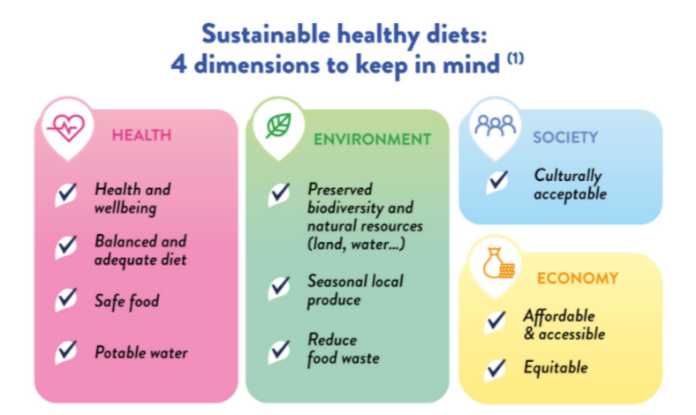The United Nations defined sustainability in 1987 as “meeting the needs of the present without compromising the ability of future generations to meet their own needs” [1]. An important part of sustainability is sustainable diets, which is how to eat without compromising the future.
When talking about sustainable diets, two aspects must be taken into account: the impact foods on the environment, and the nutritional value of these foods. The environmental costs of food production and consumption must be balanced against nutrient value affecting health, affordability and social acceptability.
To sum up, sustainable healthy diets are dietary patterns that:
- Promote all dimensions of individuals’ health and wellbeing
- Have a low environmental impact
- Are accessible, affordable, safe, equitable and culturally acceptable. [2]

Why should we adopt a sustainable diet?
On the one hand, food production is a major cause of global warming. The current food production system is responsible for 30% of global greenhouse gas emissions, 70% of water use, and a loss of continental and marine biodiversity [3]. And 49% of the habitable land is used by agriculture [4].
On the other hand, the prevalence of undernutrition, obesity and other diseases related to malnutrition are worrying due, for example, to the low nutritional quality food supply [3].
In parallel, the world population continues to grow, estimated at 10 billion in 2050, increasing the pressure on the environment and global health [3].
According to EAT-Lancet commission (2019), “a radical transformation of the global food system is needed” [3].
The good news is that we can change the world through what we eat and how we produce and manage food. Researchers have estimated that by changing current diets, greenhouse gas emissions from food could be reduced by as much as 50% [5] [6]. Changing agricultural practices may add further reductions [3] [7].
How to eat more sustainable?
Switching to a sustainable diet is not as straight-forward as it might seem. The key of a healthy sustainable diet is to identify the foods, which have a high nutrient-density, a low environmental footprint whilst also being affordable and culturally accepted. In practice, here are some advices [3]:
- Increase the consumption of vegetables, fruits, nuts and seeds
- Eat more locally-produced and seasonal foods
- Reduce food waste (1/3 of all food produced for human consumption is lost or wasted [8])
- Limit foods with added sugars and empty calories
- Limit ultra-processed food and red meat.
Flexitarian, Mediterranean and New Nordic diets are examples of diets that may be considered sustainable. These diets are plant-rich diets with modest amounts of animal-based products [2, 9, 10]. By reducing the part of animal-sources foods consumption, the environmental impact is lower. In addition, the occasional consumption of animal-sourced helps to cover nutritional needs (such as vitamin B12, required iron amount). The Flexitarian, Mediterranean and New Nordic diets are therefore interesting compromises for a balanced and sustainable diet [2, 9, 10].



